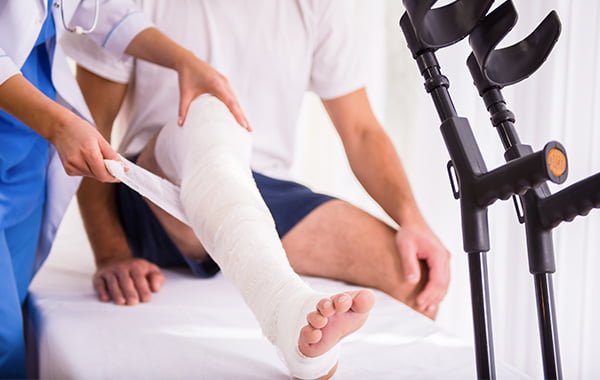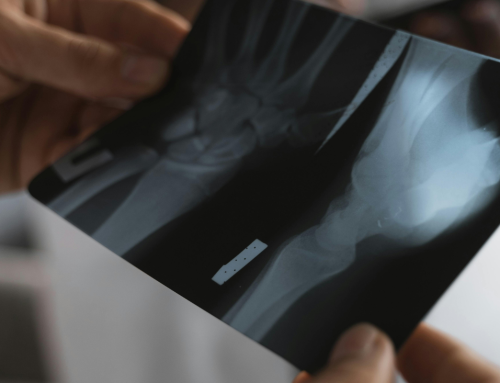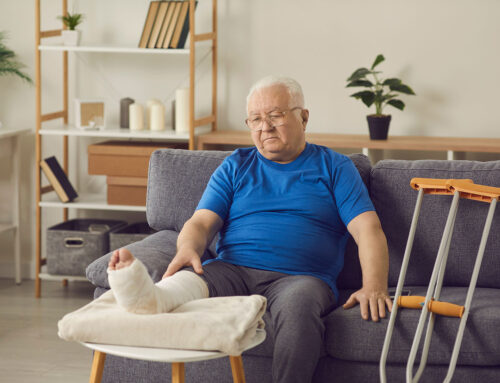What do Beyonce, Woody Harrelson, and Natalie Portman have in common? They’re all vegans! Plant-based diets are becoming increasingly more popular. And now with products like juicy plant burgers and a range of faux cheeses, veganism isn’t just for hippies anymore, but becoming more mainstream and accessible to a greater amount of people.

There are many benefits to eating a plant-based diet, including lower risk for heart disease, obesity, type 2 diabetes, and some cancers, but new research is finding that vegans are more likely to break a bone than fish and meat-eaters. The good news is that with a balanced diet of essential bone-building minerals and vitamins, vegans can better the health of their bones and speed healing of fractures.
Vegans are more at risk of developing bone fractures
Last November, a landmark study was published looking at the link between diet and the risk of bone fractures. It consisted of nearly 55,000 participants in the UK and compared meat eaters, fish eaters, vegetarians, and vegans. They found that vegans had a 43 percent higher risk of fractures compared to meat-eaters.
“This is the first comprehensive study on the risks of both total and site-specific fractures in people of different diet groups,” said lead author Dr. Tammy Tong, a nutritional epidemiologist at the University of Oxford, in a press release.
“We found that vegans had a higher risk of total fractures which resulted in close to 20 more cases per 1000 people over a 10-year period compared to people who ate meat. The biggest differences were for hip fractures, where the risk in vegans was 2.3 times higher than in people who ate meat, equivalent to 15 more cases per 1000 people over 10 years.”
As well as hip fractures, they found that vegans are also at a higher risk of developing leg, clavicle, ribs, and vertebrae fractures. The authors attribute these risks to the lower body mass index (BMI) of vegans and lower average intakes of calcium and protein.
Vegans have lower bone mineral density
Compared to an omnivore diet, vegans and vegetarians also have lower bone mineral density (BMD), found one study. Bone mineral density measures the amount of minerals, primarily calcium, in your bones. As we age, our bones lose density, but there are also a number of other factors that can affect bone health. Diet is a large contributor to BMD, especially calcium and vitamin D and other nutrients such as protein, vitamin B12, zinc, and n-3 fatty acids, which may be lacking in vegan diets.
Another recent study attributed the lower bone mineral density mainly to low body mass index and smaller waist circumference. And while there can be a lack in some nutrients, plant-based diets tend to contain more of several protective nutrients, including magnesium, potassium, vitamin K, and antioxidant and anti-inflammatory phytonutrients.
How to improve bone density
The number one factor vegans should consider in regards to bone health is diet. This means ensuring that vital minerals and nutrients are included in what you eat every day.
While in the past, vegans had to eat lots of beans, nuts, and seeds to ensure a balanced diet, there are now many enriched foods on the market. Tofu and many alternative kinds of milk, like soy, almond and oat, are now fortified with calcium and vitamin D, meaning more are added.
Make sure you’re not only eating french fries, sugary cereals, and other highly processed food. A well-balanced diet full of whole grains, protein sources, fruits, and vegetables is essential, and supplements may be required on the advice of your doctor. Health care providers should also monitor vegan patients for adequate blood levels of vitamin B-12, iron, ferritin, calcium and vitamin D.
While it can be exhausting to track everything you eat, maybe prunes are all you need?
A study of post-menopausal women found that eating five or six prunes a day can prevent the loss of total body bone mineral density. Prunes have many bone-helping vitamins and minerals, including potassium, vitamin K, phosphorous, and boron.
Don’t want to eat prunes every day? There are a variety of foods that contain bone-building minerals and vitamins.
Calcium: If calcium concentrations in your blood and muscles are low, the body starts to take calcium from the bones, decreasing bone density. Vegan calcium sources include blackstrap molasses, tofu, broccoli, figs, oranges, and dark leafy vegetables like kale, bok choy, and mustard greens.
Vitamin D: Vitamin D is required for calcium absorption and bone health. But don’t think you can just get your vitamin D from the sun, as in the winter, Canadians get little to none this way. Vegan vitamin D sources include mushrooms, fortified cereals, soy and almond milk.
Protein: Protein makes up around 50 percent of the volume of our bones and is key for bone health, helping to prevent osteoporosis. Research has found that soy protein has the same effects on bone health as animal-based proteins. Vegan protein sources include tofu, seitan, edamame, lentils, oatmeal, and green peas.
Healing a broken bone
While bones don’t heal any differently if you are vegan, there are things you can do to speed healing. Following a balanced diet, as described above, will improve bone health and speed healing after a fracture. Quit smoking if you do and limit or eliminate alcohol intake.
If you are vegan and concerned about how your diet may affect healing bones, Low-Intensity Pulsed Ultrasound (LIPUS) can be used to speed the healing of a fracture. LIPUS use activates cell-reproduction and protein expression and enhances cellular behaviour at the fracture site. Studies show that non-union fractures have a heal rate of 86%, cast time can be reduced by 22% and fresh fractures will heal 38% faster on average with LIPUS therapy.
Our team at Inline Medical Inc. is experienced with working with those with plant-based diets who have sustained a bone fracture. We have the only subsidized rental program of LIPUS devices for Canadians and provide one-on-one training on how the therapy works. We look forward to working with you to discuss your options for fracture healing.





